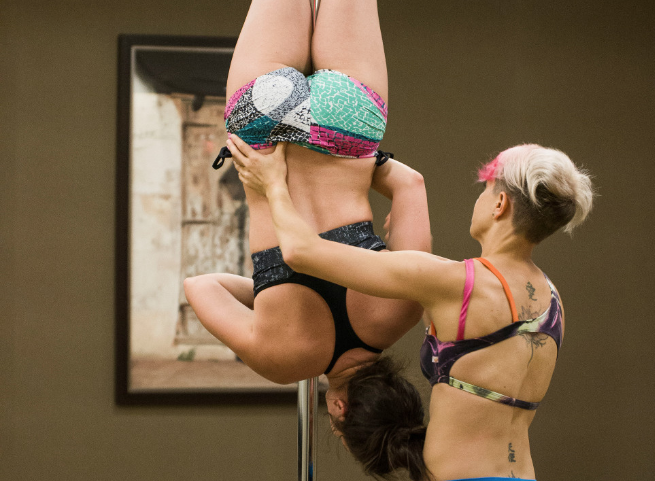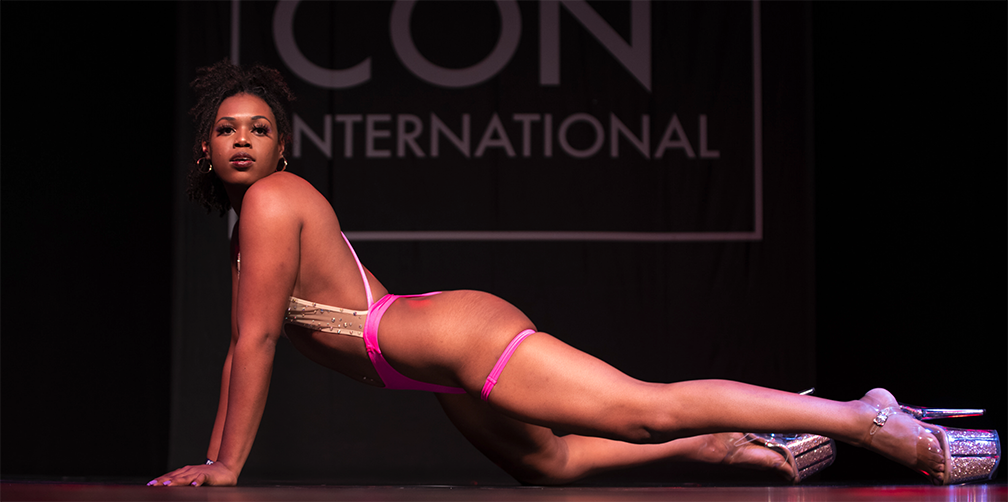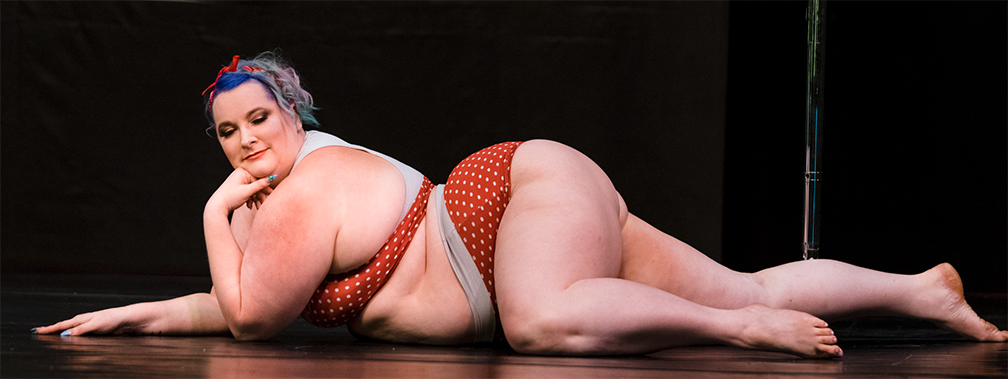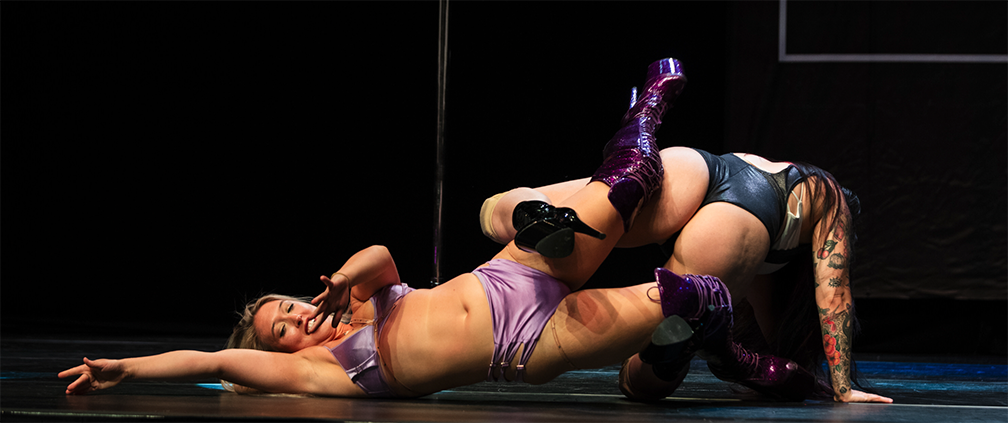
Why becoming a pole teacher is not the next step in your pole journey
Talk about a controversial start to a blog post!
When I first started doing pole, there was a clear progression for any pole student on their pole journey:
- First, you took some classes.
- Then you started performing
- Then you started doing competitions.
- Then you started teaching.
This “career ladder” didn’t really come from anywhere but was what all the other pole kids at my home studio were doing so why not do it too, right?
WRONG!
I watched a lot of people who LOVED doing pole burn out over the pressure to perform and compete. People who were totally fine and comfortable in class doing crazy tricks or graceful flows just had too many nerves on stage and the very act of then being judged for what they did (or didn’t do) sucked all the joy out of poling. There are of course, TONS of people that do like performing and competing. My point is that performing and/or competing isn’t for everyone and shouldn’t be an expectation as the “next step” in anyone’s individual journey.
Now back to the topic at hand. Being a pole teacher can be a wonderfully fulfilling thing to do. Of all the many jobs that I do, teaching is absolutely the most rewarding. It is also the one I get paid the least to do, the one I spend the most uncompensated time doing, it takes the most toll on my body, AND it’s the one where I have most responsibility.
If you think you want to be a pole teacher, ask yourself why you are being drawn to that calling.
“I want to pole more”
A friend of mine loved pole dancing as a hobby but the studio was a little too far from her house, so she was chronically late. She decided to open her own studio in her town with the idea that it would allow her to pole more for herself.
FALSE.
As any studio owner can attest, having your own studio of any size is unlikely to see you poling more for fun or doing much of your own self-guided training. Some may find that they do pole more – a LOT more – as they are building their staff and teaching literally every single class, but few will say that they are actually poling more for the simple pleasure of it like they did when they were a hobbyist or student.
“There is only one way to do this move”
Being a pole teacher can also be really complicated. Most students come to pole with no or little prior movement/dance/fitness experience, so everything is new to them not just the pole-part. Do you know how to explain movement to someone with no understanding of where their body is in space? Do you know how to tell them what muscle is being used? Can you give multiple movement cues to help people make the brain-body connection for THEIR body? What about offering several options for a specific movement to make it accessible to different bodies rather than just your own? Do you have experience leading any type of a group class? Or what about working with someone individually?
“I don’t need to know how this works”
Pole, from a pure physical perspective, is a strange intersection of fitness and dance. It is useful for pole teachers to have experience or knowledge in both. Understanding how the muscles work to help people use their bodies in the most efficient way and to avoid injuries is critical. No, you don’t have to pass an anatomy class but understanding the theory definitely helps! Certifications are no longer new in the pole community, and they are still not universally accepted. There is wide range of options in certifications and just because a person takes one certification does not mean they are legitimately qualified to teach any and all forms of pole instantly. Similarly, someone with decades of experience teaching and zero certifications may be ridiculously qualified!
“My experience is the only experience that matters”
Because pole touches on mental, emotional, and societal issues, are you prepared to have potentially uncomfortable questions, comments, and feelings directed at you, at your students, and by your students? Do you know where the line between “just helping” someone who is going through a tough time and referring them to a specialist more equipped to help them emotionally or mentally, is?
Personally, I focus on the mechanics of teaching. I’m a great technician. I’m not a touchy-feely type of person. BUT that doesn’t mean my students don’t have those needs! I need to be aware of that and possibly guide them to other teachers who can help them in those areas while I make sure their arms are properly externally rotated.
“I can do this forever!”
Being a pole teacher can also put a toll on your body. The countless hours of lesson planning, preparing, and then delivering classes in a year-round environment WITH NO OFF SEASON can be physically and mentally exhausting. Are you prepared to develop a self-care and prehab routine that works for you? What happens when you do inevitably get injured? There are potential financial implications and usually an overwhelming feeling of letting your students down which can take a different kind of emotional and mental toll.
To recap, pole teachers spend a lot of time (most of which is uncompensated) are expected to be prepared and educated (sometimes that education is also uncompensated) to constantly produce and support a very diverse population all while being upside down in your underpants, pretty much all year-long.
Whew! Why would anyone do that!?!
I did start out by saying I loved teaching, right? =)
My point is not to dissuade those who want to share their joy of pole with others from doing so. My point is for those of you who do want to become teachers to understand a least a tiny bit more, what you might be getting yourself into and make sure that teaching is the best way for you to share that joy.
My point is also for those advanced polers who hear in class, “you should teach!” or “you should compete!” that you don’t have to *do* anything other than enjoy poling as a hobby no matter how advanced or not advanced you are. You don’t have to be throwing fonjis to be an awesome teacher just like doing crazy tricks with YOUR body in no way instantly qualifies you to teach other people to do crazy tricks with THEIR bodies.
There is far too much pressure in our world to monetize our hobbies and to add another hustle to our lives. If you like poling, JUST DO THAT. If you like being a teacher, YOU CAN DO THAT. Understand that being a prepared and supportive teacher takes a lot of time and effort and places you in a position of responsibility to your students and to yourself that is a serious commitment.
Now go out there and do whatever brings you the most joy with pole!
- Interview with New PoleCon Instructor: Melonsl - May 9, 2025
- PoleCon Hub Page: PoleCon Info - April 25, 2025
- Interview with New PoleCon Instructor: Aerial Crystal - April 4, 2025


